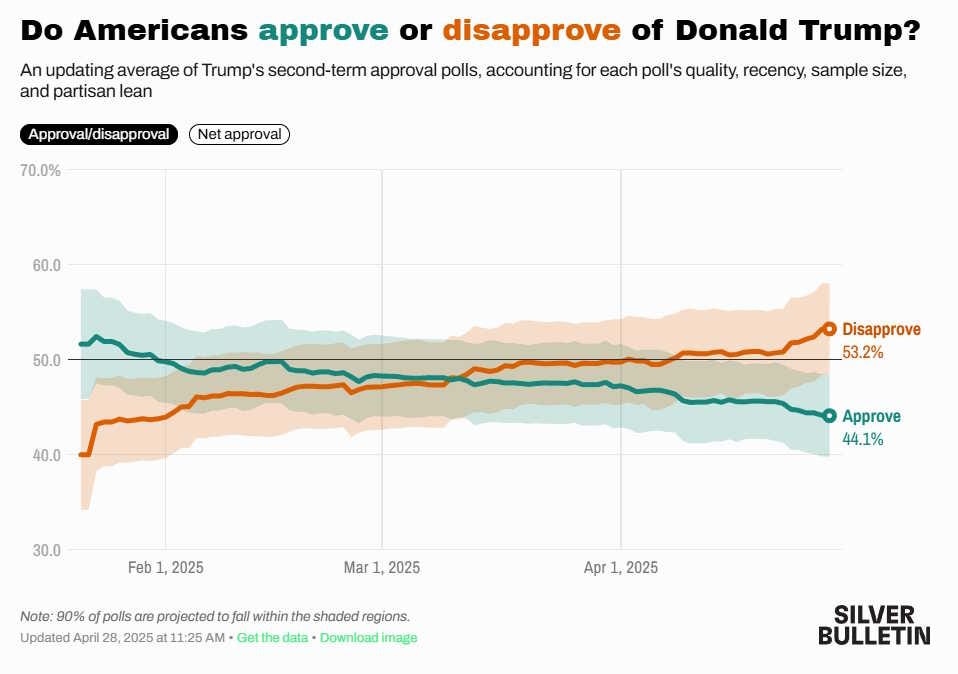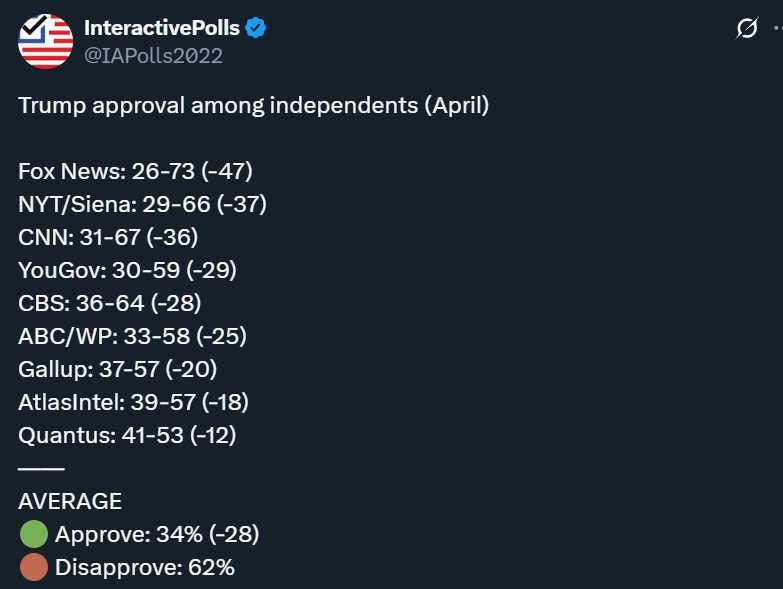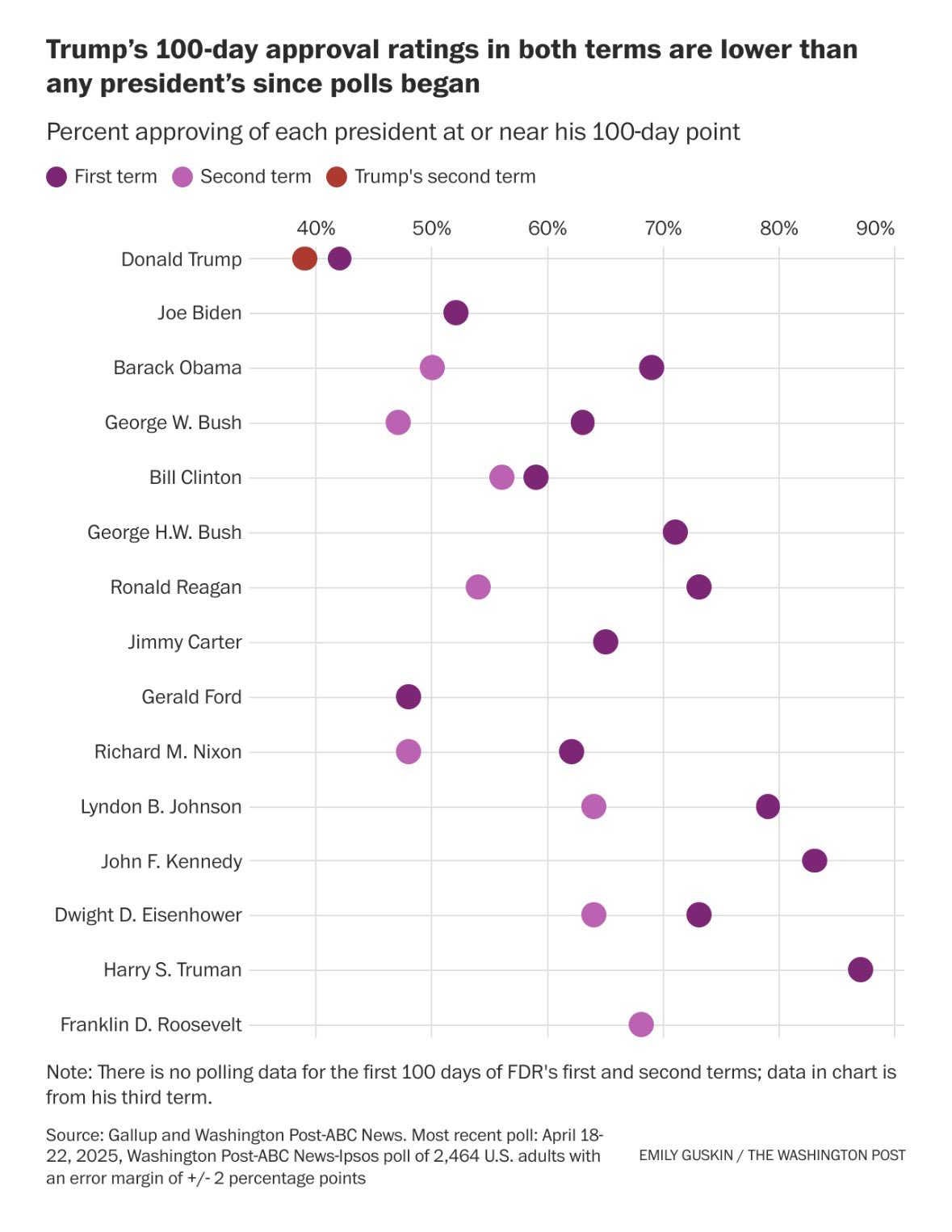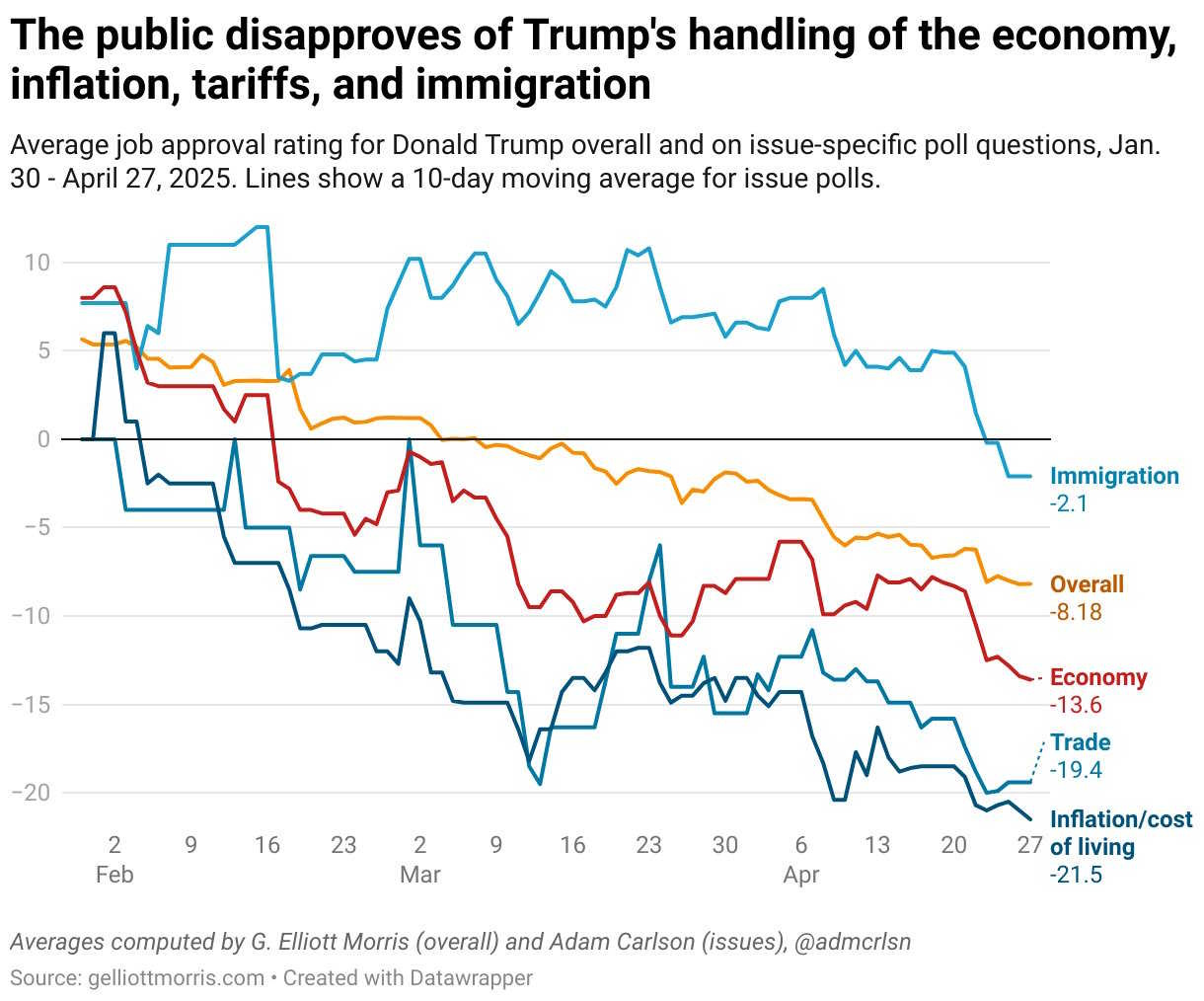If you think Americans are mad now, just wait a few months


Some guesses as to how long it will take the real pain to arrive.

S-o-o-o much data! Either our NT MAGAs are illiterate... or they don't read by choice... or they read but do not understand...
Zombies are like that. 
There are links in the seed.


"Liberation Day" seems so long ago now. I remember reading about the madness just 26 days ago, sitting at the kitchen table in an Airbnb in downtown Tokyo, getting ready to go to a book event. I recall just staring at the list of tariff rates, almost unable to believe that a sitting U.S. President would do something so destructive to the U.S. economy. I knew in that moment that I would be writing about tariffs and their downstream effects for a very long time.
You're probably tired of hearing about tariffs all the time. I know I am. But that's the problem with major disasters; they don't give you the luxury of ignoring them. The unfortunate truth is that although people are already getting very mad, the real economic pain of tariffs hasn't even hit yet, and when it does, it's going to absorb even more of our attention for at least the next year or two. That's what happened with the financial crisis of 2008 and the Great Recession of 2009-11, and that's what happened with Covid. Trump's tariffs will define the era that you and I live in now.
Anyway, before I get to the point of today's post, I have a bunch of podcasts to share. I usually post podcasts in my regular roundup, but I've been cutting back on those, because tariffs and other Trump policies have been absorbing so much of my mental energy. Over the last two weeks I've gone on a bunch of podcasts, and tariffs have been 95% of the discussion. So they really do fit with today's topic.
Here's a podcast I did with Andrew Yang, about tariffs:

And here's the YouTube link , in case you like seeing my talking head.
Here's an episode of the Search Engine podcast that I recorded with P.J. Vogt:
This one isn't as much about tariffs per se; it's about the national debt. But the two are intimately linked, because capital flight due to tariffs is raising borrowing costs for the U.S. government, and making the national debt harder to finance. Also, whether the Fed raises or lowers interest rates depends a lot on whether tariffs end up increasing or decreasing inflation (which I'll get to later in this post).
Anyway, here's another podcast about tariffs, this one with Andrew Xu, who is a very underrated interviewer:

Next, Hexapodia, my podcast with Brad DeLong , is back after a year on hiatus! This week we talked about a bunch of topics related to the Trump Era.
Anyway, tariffs are also the topic of today's post. Americans are starting to get very angry about the tariffs, as they ought to. But so far the actual economic pain from Trump's policies hasn't hit — there's been no big rise in unemployment, no cratering of GDP growth, no empty shelves and only a modest increase in inflation. So far it's all just market movements, gloomy forecasts, and anger in the media.
So we're in this strange holding pattern, a little like the period in World War 2 before the conquest of France. Humanity's great superpower is that our intelligence allows us to see disasters coming before they strike. We saw a few people get sick from Covid, and we knew it would spread. We see global temperatures rising, and we know climate change is real. We hear about approaching armies, and we know to prepare our defenses.
A lot of Americans realize that tariffs mean that pain is heading their way, and it's causing some to sour on Trump's presidency.
Americans are getting increasingly mad at Trump
Trump started his second term with an approval rating that was slightly low in historical terms, but not abnormally low, and better than at the start of his first term. Unlike in 2016 he won the popular vote, along with every single swing state; it felt like he represented a national consensus this time.
But the tariffs have already ended Trump's "honeymoon" period. Trump has gone from around 12 points up in poll averages to 9 points down, with a significant portion of that shift happening after "Liberation Day":
 Source: Nate Silver
Source: Nate Silver
And among political Independents,1 his numbers are even more abysmal:

This is a historically rapid collapse in approval. Here's a Washington Post poll comparing Trump 2.0 to previous presidencies (including his own first term):
 Source: WaPo via Richard Hanania
Source: WaPo via Richard Hanania
The Republicans are polling lower as a party as well.
Tariffs are clearly the driver of this. Poll after poll shows that Americans disapprove of Trump on the economy, specifically:
Trump is…losing confidence among voters in his ability to handle the economy, an issue that he made a centerpiece of his 2024 bid for the White House and is consistently a top issue for voters. His sweeping tariffs injected volatility into the financial markets…Fifty-two percent of U.S. adults express confidence in Trump's ability to handle the economy, according to the CNN/SSRS poll, a 13-point drop from December…The Washington Post-ABC News-Ipsos poll found that nearly three-quarters of Americans, 72%, think it is 'very' or 'somewhat' likely that Trump's economic policies will cause an economic recession in the short term…The NBC News poll found that a majority of Americans disapprove of Trump's handling of trade and tariffs (61%) and inflation and the cost of living (60%).
But interestingly, it's not only the economy where Trump is losing support. For a while, his numbers on immigration held firm even as his economic numbers deteriorated. In the last couple of weeks, however, he's begun to lose support even on his most popular issue:
 Source: G. Elliott Morris
Source: G. Elliott Morris
One possibility is that as Americans sour on tariffs, they're rejecting Trump in general, which leads them to reject his other policies as well. A second possibility is that we're seeing a thermostatic opinion shift — a few polls show Americans becoming more positive on immigration since Trump was elected (though others show the opposite).
But on top of that, I think the case of Kilmar Abrego Garcia — the man illegally deported to a Salvadoran prison — is having a big effect. Trump's response to the Abrego Garcia case has been very authoritarian, including the possible defiance of a Supreme Court decision. Even some Trump supporters like Joe Rogan and Bill O'Reilly have spoken out against Trump's treatment of Abrego Garcia. Polls show strong majorities favoring his return, and even a sizeable minority of Republicans say Trump has "gone too far" in expanding the powers of the presidency. Americans also seem capable of distinguishing border security from the Abrego Garcia case — they still approve of Trump's success in stanching the flow of asylum seekers across the southwestern border, even as they increasingly sour on his approach to deportations.
A number of people I talk to expect the deterioration in Trump's approval ratings to stop at a fairly high "floor" of maybe 35%. This idea is probably based on Trump's first term. But it's important to realize that during Trump's first term, up until Covid, Americans on the whole never suffered economically . The late 2010s featured low unemployment, robust wage growth, low inflation, and rising asset markets.
That's going to change now. The real economy hasn't begun to suffer from tariffs yet, but it soon will, and when it does, Americans will be hurt in a way that they never were during Trump 1.0. At that point we will see how much of a floor Trump's approval really has.
So how long will it take the real pain to arrive? There will be a bit of pain in a month or two, especially in specific industries, but the worst is probably still at least six months away — and possibly much more.
The real economic pain has yet to arrive, but it's on the way
Whatever







Was Trump re-elected to be a popular President? That's not the election I saw. In fact, Trump's favorability rating still microscopically higher than it was on election day in 2024. Trump wasn't popular during his first term. Trump wasn't popular as a candidate in 2024. So these approval polls seem like throwing crap at the wall to see what sticks.
Obviously the people who have benefited most from a failed status quo are upset. And now they're worried their gravy train may have left the station. After only 100 days, it appear Trump has dismantled enough of that failed status quo to make a return to business-as-usual difficult. And Trump will be an obstacle for business-as-usual politics for another 3 years and 8 months. Pretty grim outlook for those who benefited most for what was.
Omg just stop with that gaslighting. I mean it’s insanity watching people excuse this madness. All of the “he’s just joking” shit got too old for you? So now you’re going to go with “he’s not supposed to be popular?” Holy fucking shit, how do people disseminate this garbage without vomiting on themselves!
Check out the provided link to Real Clear Politics. Favorability ratings above 40% are great numbers for Trump. That's the real polling data; I'm not making it up. Trying to use Trump's unpopularity as a political weapon is just stupid.
Trump was not popular as a candidate. An unpopular candidate won the 2024 election. Does that reality bite too hard? Trump doesn't fit the mold for retail politics.
Trump is dismantling the status quo in spectacular fashion. Why would anyone think that status quo politics will change that? Trump has bypassed Democrats' ability to use Congressional procedure to obstruct. Trump has overwhelmed Democrats' ability to use the courts to obstruct. Trump is dismantling the bureaucracy that Democrats have used to obstruct. Trump has a Sharpie and he's using it (just like Barack Obama used a pen).
This is all ridiculous, although I do think you are sincere. Trump has two life motives, grift as much money as he can, and exercise power. Trump has no objection to an oligarchy, he just wants to be part of it and/or make the oligarchs personally beholden to him.
When you have a person so rotten to the core in charge of your country, you will get poisoned fruit.
BTW, in a newly released interview Trump actually says he runs the world.
After the first 100 days, the vast majority of Americans think Trump is a total failure. And, as Trump has said, he's just getting started. His incompetence, ineptitude and severe antisocial personality disorder are being recognized even by his own supporters more and more every day.
... and he may succeed in transforming America into a fascist dictatorship all the same...
That's his goal. As bad as they've become so far, things are going to get much uglier.
His economic crap is preoccupying all the media... while the assault on voting continues full speed ahead. I'm pessimistic.
Frankly, so am I. We are in grave danger.
Trump has already caused irreversible, irrevocable damage to America's international standing. Domestically, we are heading for severe economic decline. Authoritarians take advantage of economic collapse and chaos to impose their rule. It is a breeding ground for fascism.
He also wants to use the military to police American citizens according to his autocratic wishes and desires. Bad news.
UPS announced today they are laying off 20,000 employees due to the terrible economic situation anticipated from tariff fallout.
Empty ports leave trucking companies with no goods to transport.
That product loss situation won't start showing up until later this month with empty shelves for consumers.
It will keep getting worse because there are no firm deals on the table concerning tariffs in spite of the dog and pony talk show spinning a false narrative.
Revving up the shipping and supply chain will still mean weeks or months in goods reaching consumers. The costs still won't be lower, in fact possibly much, much higher.